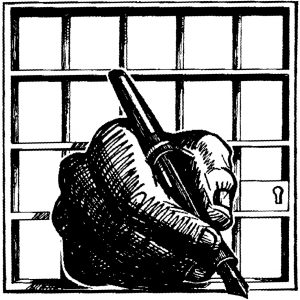From the September-October 2016 issue of News & Letters
by Robert Taliaferro
Wisconsin prisoners in the state’s maximum-security facilities have recently been involved with a hunger strike. The purpose is to end the draconian use of long-term solitary confinement, which has been used by Wisconsin for decades as an integral part of their correctional policy. An additional goal was to improve medical care for prisoners who find themselves in segregation mainly due to mental illness.

Voices from within the Prison Walls
By D.A. Sheldon. News & Letters, 1998. 71 pp. $8… Free to prisoners. $16 for two copies: purchaser and a prisoner (includes postage.) Contains: Preface; Introduction;
Part I • “The Grim Reality of the American Criminal (In)Justice System”; Part 2 • “Organizing the Revolution from Within: a Marxist-Humanist Perspective.” Click here to order.
Wisconsin has one of the most severe prison disciplinary policies in the country. While the majority of states discipline a prisoner for up to 60 days, even an innocuous offense such as “improper storage” can get a person 90 days of segregation time, five lost good time days, and an extension of a mandatory release (MR) or extended supervision (ES) date up to 10 days.
For being late, a Wisconsin prisoner can receive 180 days of segregation, 10 days of lost good time and 15 days added to MR or ES. A dirty cell gets you 90 days of segregation, five days loss of good time and 10 days added on MR or ES. More serious offenses can receive up to 360 days of segregation, 20 days loss of good time and 40 days added to MR or ES.
STOP ARBITRARY PUNISHMENTS!
Administrative segregation is another sanction at the heart of the hunger strike. The confinement can be for years at a time, based on an arbitrary set of standards that are often capriciously applied and racist. Where it is used, the majority of those subject to it are people of color, predominantly Black.
This form of punishment extends well beyond the court-sanctioned punishments prisoners received for whatever crimes they committed. Some feel that such punitive actions amount to state-sanctioned torture.
The hunger strikers in Wisconsin were subjected to another form of torture: court-ordered force-feeding in order to dissuade the prisoners from continuing with the strike. The prisoners say the petition contained erroneous information to make their condition seem worse than it was.
WHAT WE’RE FIGHTING FOR
Some of the objectives of the campaign, according to the Forum for Understanding Prisons (FFUP), are:
1) A legislative cap on the long-term use of solitary confinement;
2) Creation of a board or committee independent of the DOC for oversight in order to stop the DOC’s abuse of, and over classification for, “short” and “long” term disciplinary confinement;
3) Immediate transition and release to less restrictive housing of prisoners who have been on the long-term solitary confinement units for more than a year;
5) Proper mental health facilities and treatment of “short” and “long” term solitary confinement prisoners;
6) An immediate U.S. Dept. of Justice investigation into the mind control program operated by the DOC.
Though these conditions and objectives are specific to the men in Wisconsin, they need to apply nationwide.
If you attempt to crush individuality by using torture to break a person’s mind, you are a despot. In that regard, there’s only a marginal difference between the gulags of Stalin’s Russia and prisons in the U.S.
Wisconsin hunger strike participants (source, FFUP): Uhuru Mutawakkil, Cesar DeLeon, Shirell Watkins, LaRon McKinley Bey, Joshua Scolman, Parish Golden, and Lamar Larry. LaRon McKinley Bey and Cesar DeLeon have been on strike since June 7.
